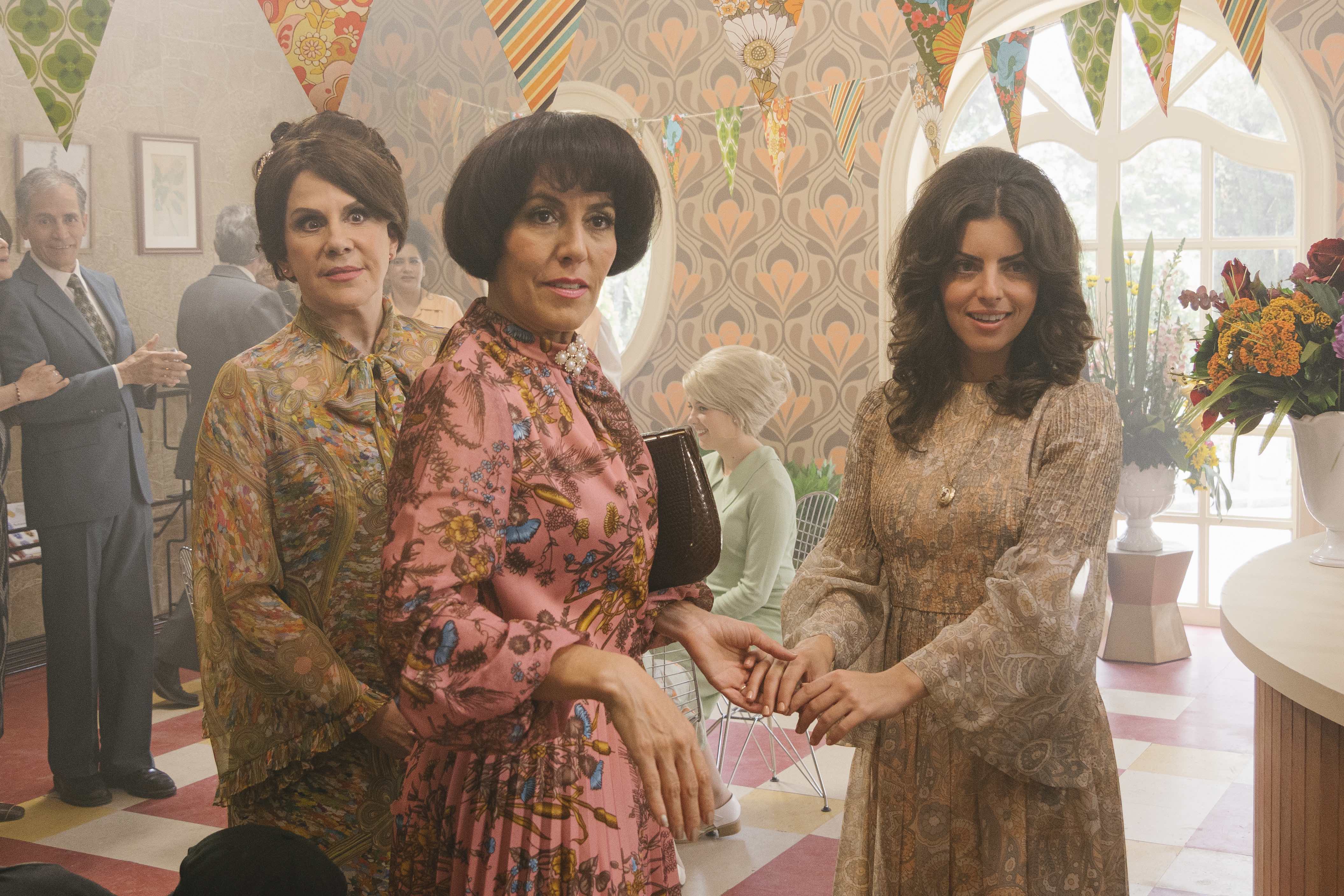Where the season two premiere of Netflix’s La Casa de las Flores (House of Flowers) began by pulling back the curtain on Virginia de la Mora’s disappearance, season three’s first episode takes us back 40 years. This move back lets us see the formation of the relationships that shaped the late Virginia’s life. (Spoilers related to seasons one, two and the season three premiere ahead.)
As teased by a preview trailer released earlier this month, the final season of the Spanish-language Netflix original follows Virginia’s coming of age in 1979 Mexico City as her former household deals with the fallout from their modern-day choices and secrets. However, the episode addresses one of the biggest cliffhangers from season two in its opening scene, with a frightened Paulina (Cecilia Suárez) arriving in prison after taking a fall for Diego (Juan Pablo Medina) on charges of soliciting at the cabaret. The soft-spoken Paulina is accosted by the other inmates and confronted by her cellmate, Jenny Quetzal (Mariana Treviño), cult leader and unreciprocated romantic interest of father Ernesto de la Mora (Arturo Ríos) in season two.
It’s clear Paulina is an extremely unfavorable environment, far removed from the upper-class ways of her family home. No so for the opportunist Jenny, who has already amassed a following inside prison. Her cult’s banner even hangs from her cell wall. Things manage to get worse for the eldest de la Mora sibling later in the episode when we are introduced to “La Chiva,” a former family nurse who wants revenge upon hearing Paulina’s name. And that’s on top of hearing that María José is unable to help with the legal process. If that wasn’t bad enough, Paulina hasn’t moisturized in days.

Back in the 1970s, we are introduced to a young Virginia (Isabel Burr) right after the opening credits. Unlike the conservative, older Virginia we had met in season one, this Virginia is late to her own birthday party at the flower shop, having gotten distracted by a very classy looking vibrator. She clashes with her strict mother Victoria (Rebecca Jones) about everything: getting up late, not seeing her dad, even her choice in friends, namely a young Ernesto (Tiago Correa), which keep her from picking a suitable suitor.
As we get to finally meet Victoria, both past and present, we learn how good appearances and outdated social norms have ruled her life. In scenes set in the past, we see her shame Virginia’s private habits and warn her of Ernesto’s family, citing their rumored immorality, in an attempt to drive her away from her then-best friend and future husband.
In the present, meanwhile, the older Victoria (Isela Vega) continues casting her antiquated judgments about Virginia’s family. When she sees Julian (Dario Yazbek Bernal) with Diego at the hospital visiting a comatose Elena (Aislinn Derbez) she takes a homophobic tone and refuses to acknowledge they are a couple. Later, when the family learns Elena is expecting a child out of wedlock, Victoria seriously suggests taking her to a ranch to carry out the pregnancy and giving away the child the way “reputable” society did back in her day. It’s an honest remark from the character that can only land as a joke for a modern audience.
Micaela (Alexa de Landa), who has brought touches of magical realism and comments which break the fourth wall to previous seasons, is the first to confront Victoria after an attempt to shame her for her weight and her mother suicide falls flat. Micaela tells Victoria she should drop her “last century” beliefs, both a dismissal of the comments and a vocal expression of what the viewer has to think about Victoria’s coarse words.
In a return to the past, we find out Virginia and Ernesto are planning to ditch the birthday party for a getaway to Acapulco. Virginia can’t wait to leave, complaining she feels the party feels more like an event for her mom than her birthday. They ask Carmelita, who grows to become Virginia’s cafecito and chisme buddy later in life, to cover for them. These scenes set in the past ooze with vintage style. They are set to classics including “Amor Divino,” Angelica María’s cover of “Steady Eddy” and “Mi Gran Noche,” bringing the old-school Mexico vibe full circle. Set in a defining period for Mexican and Spanish-language music, one can only expect more great period tracks as this new season plays on.
The episode closes with Virginia’s friend and future family psychologist Salo Cohen (Javier Jattin) and two new characters, Pato and his older neighbor Martin, driving down the highway to Acapulco. The omniscient voice of Roberta, who provides voice-over at the beginning and end of each episode, remarks that the people we spend the rest of our lives with are those who are with us “through life’s twists and turns.”
While the season three opener doesn’t get to every loose thread in the previous season finale, it sets us up to learn how the family got into the tangle audiences have come to love.
La Casa de las Flores’ third season is now streaming on Netflix.







